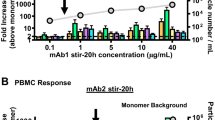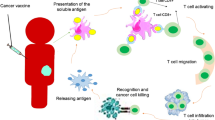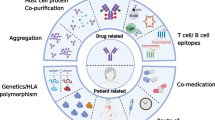Abstract
Heat shock proteins such as gp96 are immunogenic and are widely used as vaccines in immunotherapy of cancers. The present study focuses on the use of peptide mimotopes as immunotherapeutic vaccines for prostate cancer. To this end, we developed a 15-mer gp96 peptide mimotope specifically reactive to MAT-LyLu gp96–peptide complex using combinatorial single-chain antibody and peptide phage display library. The immunogenicity of the synthesized gp96 mimotope was analyzed initially in normal BALB/c mice in combination with various adjuvants such as complete Freund’s adjuvant (CFA), aluminum salts (ALUM), granulocyte-macrophage colony-stimulating factor (GM-CSF), and liposome, of which CFA served as a positive control. The antibody response was determined and found that the gp96 mimotope with ALUM showed a significant increase in antibody titer, followed by GM-CSF and liposomes. Further, the T cell (CD4+ and CD8+) populations from splenocytes, as well as IgG isotypes, interleukin-4, and interleukin-5 of gp96 mimotope with ALUM-immunized animals, were analyzed. The results suggest that the gp96 mimotope may elicit a potent and effective antitumor antibody response. Further, the study identifies ALUM and GM-CSF as adjuvant options to drive an appropriate protective immune response as these adjuvants have prior use in humans.








Similar content being viewed by others
References
Ashok BT, David L, Chen YG, Garikapaty VP, Chander B, Kanduc D, Mittelman A, Tiwari RK (2003) Peptide mimotopes of oncoproteins as therapeutic agents in breast cancer. Int J Mol Med 11(4):465–471
Assikis VJ, Daliani D, Pagliaro L et al (2003) Phase II study of an autologous tumor derived heat shock protein–peptide complex vaccine (HSPPC-96) for patients with metastatic renal cell carcinoma (Mrcc). 2003 ASCO annual meeting proceedings, Chicago, USA (Abstract 1552)
Belli F, Testori A, Rivoltini L, Maio M, Andreola G, Sertoli MR, Gallino G, Piris A, Cattelan A, Lazzari I, Carrabba M, Scita G, Santantonio C, Pilla L, Tragni G, Lombardo C, Arienti F, Marchianò A, Queirolo P, Bertolini F, Cova A, Lamaj E, Ascani L, Camerini R, Corsi M, Cascinelli N, Lewis JJ, Srivastava P, Parmiani G (2002) Vaccination of metastatic melanoma patients with autologous tumor-derived heat shock protein gp96–peptide complexes: clinical and immunologic findings. J Clin Oncol 20(20):4169–4180
Bendz H, Ruhland SC, Pandya MJ, Hainzl O, Riegelsberger S, Braüchle C, Mayer MP, Buchner J, Issels RD, Noessner E (2007) Human heat shock protein 70 enhances tumor antigen presentation through complex formation and intracellular antigen delivery without innate immune signaling. J Biol Chem 282(43):31688–31702
Binder RJ, Kelly JB 3rd, Vatner RE, Srivastava PK (2007) Specific immunogenicity of heat shock protein gp96 derives from chaperoned antigenic peptides and not from contaminating proteins. J Immunol 179(11):7254–7261
Bonnycastle LL, Mehroke JS, Rashed M, Gong X, Scott JK (1996) Probing the basis of antibody reactivity with a panel of constrained peptide libraries displayed by filamentous phage. J Mol Biol 258(5):747–762
Calderwood SK, Mambula SS, Gray PJ Jr (2007) Extracellular heat shock proteins in cell signaling and immunity. Ann NY Acad Sci 1113:28–39
Cohen L, de Moor C, Parker PA, Amato RJ (2002) Quality of life in patients with metastatic renal cell carcinoma participating in a phase I trial of an autologous tumor-derived vaccine. Urol Oncol 7(3):119–124
Doody AD, Kovalchin JT, Mihalyo MA, Hagymasi AT, Drake CG, Adler AJ (2004) Glycoprotein 96 can chaperone both MHC class I- and class II-restricted epitopes for in vivo presentation, but selectively primes CD8+ T cell effector function. J Immunol 172(10):6087–6092
Fink AL (1999) Chaperone-mediated protein folding. Physiol Rev 79(2):425–449
Gastpar R, Gross C, Rossbacher L, Ellwart J, Riegger J, Multhoff G (2004) The cell surface-localized heat shock protein 70 epitope TKD induces migration and cytolytic activity selectively in human NK cells. J Immunol 172(2):972–980
Gullick WJ (1994) Production of antisera to synthetic peptides. Methods Mol Biol 32:389–399
Guy B (2007) The perfect mix: recent progress in adjuvant research. Nat Rev Microbiol 5(7):505–517
Hartl FU, Hayer-Hartl M (2002) Molecular chaperones in the cytosol: from nascent chain to folded protein. Science 295(5561):1852–1858
Hoos A, Levey DL, Lewis JJ (2004) Autologous heat shock protein–peptide complexes for vaccination against cancer: from bench to bedside. Dev Biol (Basel) 116:109–115
Janetzki S, Palla D, Rosenhauer V, Lochs H, Lewis JJ, Srivastava PK (2000) Immunization of cancer patients with autologous cancer-derived heat shock protein gp96 preparations: a pilot study. Int J Cancer 88(2):232–238
Janeway CA Jr, Medzhitov R (2002) Innate immune recognition. Annu Rev Immunol 20:197–216
Jolivet-Reynaud C, Lésenéchal M, O'Donnell B, Becquart L, Foussadier A, Forge F, Battail-Poirot N, Lacoux X, Carman W, Jolivet M (2001) Localization of hepatitis B surface antigen epitopes present on variants and specifically recognised by anti-hepatitis B surface antigen monoclonal antibodies. J Med Virol 65(2):241–249
Jolivet-Reynaud C, Adida A, Michel S, Deléage G, Paranhos-Baccala G, Gonin V, Battail-Poirot N, Lacoux X, Rolland D (2004) Characterization of mimotopes mimicking an immunodominant conformational epitope on the hepatitis C virus NS3 helicase. J Med Virol 72(3):385–395
Li Z (1997) Priming of T cells by heat shock protein–peptide complexes as the basis of tumor vaccines. Semin Immunol 9(5):315–322
Li Z, Menoret A, Srivastava P (2002) Roles of heat-shock proteins in antigen presentation and cross-presentation. Curr Opin Immunol 14(1):45–51
Mazzaferro V, Coppa J, Carrabba MG, Rivoltini L, Schiavo M, Regalia E, Mariani L, Camerini T, Marchianò A, Andreola S, Camerini R, Corsi M, Lewis JJ, Srivastava PK, Parmiani G (2003) Vaccination with autologous tumor-derived heat-shock protein gp96 after liver resection for metastatic colorectal cancer. Clin Cancer Res 9(9):3235–3245
Multhoff G, Mizzen L, Winchester CC, Milner CM, Wenk S, Eissner G, Kampinga HH, Laumbacher B, Johnson J (1999) Heat shock protein 70 (Hsp70) stimulates proliferation and cytolytic activity of natural killer cells. Exp Hematol 27(11):1627–1636
Nissim A, Hoogenboom HR, Tomlinson IM, Flynn G, Midgley C, Lane D, Winter G (1994) Antibody fragments from a ‘single pot’ phage display library as immunochemical reagents. EMBO J 13(3):692–698
Oki Y, Younes A (2004) Heat shock protein-based cancer vaccines. Expert Rev Vaccin 3(4):403–411
Pilla L, Patuzzo R, Rivoltini L, Maio M, Pennacchioli E, Lamaj E, Maurichi A, Massarut S, Marchianò A, Santantonio C, Tosi D, Arienti F, Cova A, Sovena G, Piris A, Nonaka D, Bersani I, Di Florio A, Luigi M, Srivastava PK, Hoos A, Santinami M, Parmiani G (2006) A phase II trial of vaccination with autologous, tumor-derived heat-shock protein peptide complexes Gp96, in combination with GM-CSF and interferon-alpha in metastatic melanoma patients. Cancer Immunol Immunother 55(8):958–968
Pockley AG, Muthana M, Calderwood SK (2008) The dual immunoregulatory roles of stress proteins. Trends Biochem Sci 33(2):71–79
Richards J, Testoria A, Whitman E et al (2006) Autologous tumor-derived HSPPC-96 vs. physician’s choice (PC) in a randomized phase III trial in stage IV melanoma. ASCO annual meeting proceedings, Atlanta, USA (2006) (Abstract 8002)
SenGupta D, Norris PJ, Suscovich TJ, Hassan-Zahraee M, Moffett HF, Trocha A, Draenert R, Goulder PJ, Binder RJ, Levey DL, Walker BD, Srivastava PK, Brander C (2004) Heat shock protein-mediated cross-presentation of exogenous HIV antigen on HLA class I and class II. J Immunol 173(3):1987–1993
Sharav T, Wiesmüller KH, Walden P (2007) Mimotope vaccines for cancer immunotherapy. Vaccine 25(16):3032–3037
Shedlock DJ, Shen H (2003) Requirement for CD4 T cell help in generating functional CD8 T cell memory. Science 300(5617):337–339
Srivastava P (2002) Interaction of heat shock proteins with peptides and antigen presenting cells: chaperoning of the innate and adaptive immune responses. Annu Rev Immunol 20:395–425
Srivastava PK, Deleo AB, Old LJ (1986) Tumor rejection antigens of chemically induced carcinomas of inbred mice. Proc Natl Acad Sci USA 83:3407–3411
Srivastava PK, Chen YT, Old LJ (1987) 5′-Structural analysis of genes encoding polymorphic antigens of chemically induced tumors. Proc Natl Acad Sci USA 84(11):3807–3811
Sun JC, Bevan MJ (2003) Defective CD8 T cell memory following acute infection without CD4 T cell help. Science 300(5617):339–342
Suriano R, Ghosh SK, Ashok BT, Mittelman A, Chen Y, Banerjee A, Tiwari RK (2005) Differences in glycosylation patterns of heat shock protein, gp96: implications for prostate cancer prevention. Cancer Res 65:6466–6475
Suto R, Srivastava PK (1995) A mechanism for the specific immunogenicity of heat shock protein-chaperoned peptides. Science 269(5230):1585–1588
Testori A, Richards J, Whitman E, Mann GB, Lutzky J, Camacho L, Parmiani G, Tosti G, Kirkwood JM, Hoos A, Yuh L, Gupta R, Srivastava PK, C-100-21 Study Group (2008) Phase III comparison of vitespen, an autologous tumor-derived heat shock protein gp96 peptide complex vaccine, with physician’s choice of treatment for stage IV melanoma: the C-100-21 Study Group. J Clin Oncol 26(6):955–962, Erratum in: J Clin Oncol 26(22): 3819
Tsan MF, Gao B (2004) Cytokine function of heat shock proteins. Am J Physiol Cell Physiol 286(4):C739–C744
Udono H, Levey DL, Srivastava PK (1994) Cellular requirements for tumor-specific immunity elicited by heat shock proteins: tumor rejection antigen gp96 primes CD8+ T cells in vivo. Proc Natl Acad Sci USA 91(8):3077–3081
Wallin RP, Lundqvist A, More SH, von Bonin A, Kiessling R, Ljunggren HG (2002) Heat-shock proteins as activators of the innate immune system. Trends Immunol 23(3):130–135
Wang HH, Mao CY, Teng LS, Cao J (2006) Recent advances in heat shock protein-based cancer vaccines. Hepatobiliary Pancreat Dis Int 5(1):22–27
Yedavelli SP, Guo L, Daou ME, Srivastava PK, Mittelman A, Tiwari RK (1999) Preventive and therapeutic effect of tumor derived heat shock protein, gp96, in an experimental prostate cancer model. Int J Mol Med 4(3):243–248
Acknowledgments
We gratefully acknowledge the financial assistance of AVT and the National Cancer Institute RO1 grant 1RO1CA131946 (RKT).
Author information
Authors and Affiliations
Corresponding author
Rights and permissions
About this article
Cite this article
Shanmugam, A., Suriano, R., Goswami, N. et al. Identification of peptide mimotopes of gp96 using single-chain antibody library. Cell Stress and Chaperones 16, 225–234 (2011). https://doi.org/10.1007/s12192-010-0234-6
Received:
Revised:
Accepted:
Published:
Issue Date:
DOI: https://doi.org/10.1007/s12192-010-0234-6




